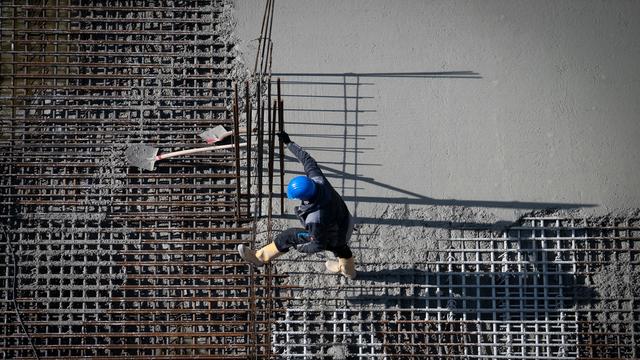The leading business institutes of Germany expect hardly any noticeable growth for 2025. According to its spring report, the gross domestic product only increases by 0.1 percent in the current year after they predicted 0.8 percent last September. In 2026, the institutes then expect an increase of 1.3 percent. Above all, the geopolitical situation and the customs policy of US President Donald Trump therefore put a strain on the economy. Added to this is the economic policy uncertainty.
“The geopolitical tensions and the Protectionist trading policy of the United States tighten the already tense economic situation in Germany,” said Torsten Schmidt, economic head of the Leibniz Institute for Economic Research (RWI). “In addition, German companies are exposed to increased international competition – especially from China.” Schmidt also led the lack of specialist staff and high bureaucratic hurdles as growth brakes.
No savings on a new government
The institutes reserve the impact of the new regulation of the debt, climate protection and infrastructure still decided by the old Bundestag. The researchers expect that hardly any additional funds for defense and investments will be called up this year. Rather, they fear that the new government does not take any steps to save due to the extended scope.
For the coming year, the institutes expect additional expenses of around 24 billion euros and a connected to an expansion impulse of 0.5 percentage points for gross domestic product. However, small business areas would benefit more from more investments in defense and the infrastructure. Since these are already well utilized, the prices could continue to rise there.
Researchers expect unemployment to increase
The business institutes were aimed at politics with an appeal for reforms. Germany not only suffers from an economic weakness, but above all have structural problems. These could not be solved by higher government spending. In this way, the social system must be adapted to demographic change so that the non -wage costs do not increase significantly.
The institutes certify negative prospects of the labor market. They refer to the increase in the unemployment rate from 5.0 percent to 6.3 percent since 2022. There have been layoffs primarily in the processing industry, the construction industry and the company service providers. For the coming months, the institutes expect a further increase in unemployment. Only when the economic situation improves in the course of 2026 will there be less unemployed again.
According to the report, the new US tariffs on aluminum, steel and vehicle imports are likely to reduce the growth of gross domestic product this year and next year by 0.1 percentage points. However, it is unclear how US President Donald Trump will continue to proceed in customs policy. It was only on Wednesday that he paused a large part of the last announced surcharges for 90 days. According to the research institutes, the concrete effects of US customs policy are difficult to quantify anyway, since customs duties have never been so much increased in the current globalized economic structure.
Effects are likely to have both the US tariffs and the changed debt rules for interest. The business institutes predict that the phase of key interest rates will soon come to an end. In the United States, the higher tariffs endanger price stability, they write. In the euro area, a more expansive financial policy will increase the capital market interest rates. If the fiscal regulations are relaxed in the euro area, the capital markets would have a more important role as a control body for sustainable state finances.
Community diagnosis is created twice a year on behalf of the Federal Ministry of Economics and Climate Protection. The German Institute for Economic Research (DIW Berlin), the IFO Institut-Leibniz Institute for Economic Research at the University of Munich e. V. In cooperation with the Austrian Institute for Economic Research (WIFO), the Kiel Institute for the World Economy (IFW Kiel), the Leibniz Institute for Economic Research Halle (IWH), the RWI-Leibniz Institute for Economic Research in Cooperation with the Institute for Higher Studies (IHS) Vienna.











